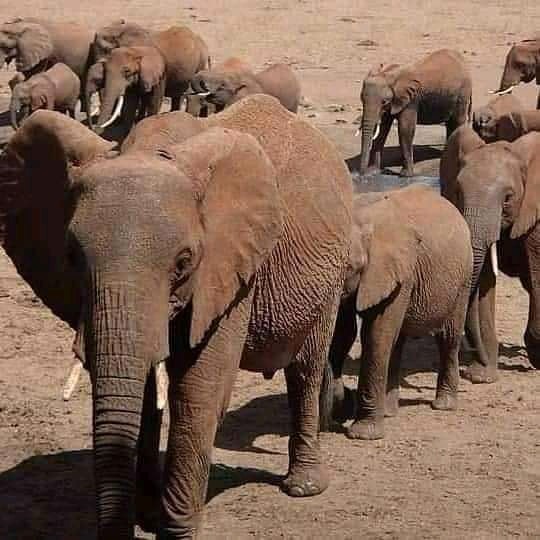UK Elephants To Be Flown To Kenya For Rewilding
Kenya and the United Kingdom (UK) intend to fly thirteen African elephants from the UK to Kwale County’s Mwaluganje Elephant Sanctuary.
The thirteen elephants, weighing a total of 25 tonnes, will be flown over 7,000 kilometers (4,350 miles) to their ancestral sanctuary in Mwaluganje Elephant Sanctuary for rewilding.
Each elephant will be transported in a specially designed container, and vets will be on hand throughout the flight.
Rewilding is a forward-thinking conservation strategy. Allowing natural processes to shape land and sea, repair damaged ecosystems, and restore degraded landscapes is the goal.
The goal of rewilding is to return ecosystems to their natural state, which frequently involves the reintroduction of native animals.
The exercise is scheduled for August and is being organized by the Aspinall Foundation (TAF) in collaboration with the Sheldrick Wildlife Trust (SWT) and the Kenya Wildlife Service (KWS).
The elephants will be moved from Howetts Wild Animal Park in Kent, UK, where they have been kept in an eight-acre enclosure.
The herd is one of Europe’s most successful breeding herds of African elephants.
Warden Jacob Orale, Senior Warden of Kwale County KWS, told KNA that substantial preparations are being made to ensure their safe arrival.
Orale also stated that the government has already begun an eradication program for tsetse flies throughout the elephant sanctuary and the entire Shimba Hills National Reserve ecosystem.
“We want to reduce the density of the tsetse flies in the ecosystem for the safety of the elephants. The breeds have been in a tsetse fly-free environment and we don’t want them to encounter the problem we have here,” Orale said.
The Aspinall Foundation is a world-class animal conservation charity based in the United Kingdom that was founded in 1984.
The foundation’s mission is to reintroduce captive-bred animals to their natural habitats in protected wilderness areas and reserves.
The Aspinall Foundation funds and manages animal protection projects in Congo, Gabon, Java, and Madagascar, as well as providing financial support to other animal protection programs in India and Cambodia.
The Kenya Tsetse and Trypanosomiasis Eradication Council (KENTTEC), in collaboration with the Wildlife Research Institute (WRI), conducted research last week to determine the levels of tsetse flies in the entire Shimba Hills National Reserve.
The two institutions discovered that the density of tsetse flies in the reserve is increasing at an alarming rate, posing a threat to certain elephant species, particularly the Black African Elephants set to be relocated from the UK.
The alarming findings compelled the government to launch a control campaign to eradicate the blood-sucking flies in collaboration with the Aspinall Foundation and the Sheldrick Wildlife Trust.
According to the Senior Warden, nearly 300 traps have already been deployed across the Mwaluganje Elephant Sanctuary to capture the blood sucking and disease-spreading insects.
He stated that the trapping operation would continue for nearly eight months, or one year, until all tsetse flies were completely eradicated from the Shimba Hills ecosystem.
“The tsetse flies are many in the entire Shimba hills ecosystem but since the elephants shall be deployed in Mwaluganje, we hope to trap all tsetse flies by August,” Orale said.
The Kenya Tsetse and Trypanosomiasis Eradication Council was established in 2012 as a State Corporation under the Ministry of Agriculture, Livestock, Fisheries, and Co-operatives as a successor to the Pan-African Tsetse and Trypanosomiasis Eradication Campaign (PATTENC).
The council is charged with coordinating the eradication of the tsetse fly in the country, setting standards, and mitigating the socioeconomic consequences of tsetse infection.
The county KWS chief revealed that the Aspinall Foundation and Sheldrick Wildlife Trust have already contacted a contractor to renovate the over 8-kilometer fence in the sanctuary and another 6 kilometers in the reserve to ensure the animals’ safety.
Furthermore, he stated that the government has implemented innovative security and monitoring measures throughout the reserve to protect the animals.
Sheldrick Wildlife Trust is one of East Africa’s pioneering conservation organizations for wildlife and habitat protection.
It is focused on running the world’s most successful orphan elephant rescue and rehabilitation program.
More than 100,000 animals have been successfully relocated by the organization.
ALSO READ:
- Rabbit Farming: Livestock Officer Challenges Common Myths
- Presidential Awardee Leads Tree Planting Campaign in Homa Bay
- Promoting Contract Farming in Murang’a County
- Review policies in East Africa Region to Adress Challenges Facing Banana Production
- Kenyans Opposes Nationwide Livestock Vaccination Plan Amid Controversy
The National Environmental Management Authority [NEMA] is currently conducting public participation on the environmental and social impact of elephant translocation and rewilding.
Among the issues being considered is the exercise’s potential impact, which includes the risk of disease transmission, human-wildlife conflict, poaching, competition for resources in the ecosystem, and elephant predation.


Comments